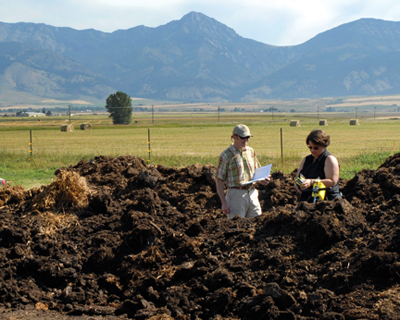
Features
Applications
Other
Study looks at turning manure into revenue
January 5, 2010 by Melynda Harrison
Livestock manure isn’t often thought of as a value-added product, but
researchers at Montana State University (MSU) and MSU Extension are
trying to change that.
Livestock manure isn’t often thought of as a value-added product, but researchers at Montana State University (MSU) and MSU Extension are trying to change that.
 |
|
| Tommy Bass, MSU Extension, and Julia Dafoe, research associate, NARC-Havre, measure compost temperature at Amaltheia Organic Dairy in Belgrade. They are part of a project to study how livestock producers may be able to create a product that can increase revenues by composting manure. Photo by Kelly Gorham, MSU
|
Producers may be able to make money by composting livestock manure while at the same time improving the quality of their soil and protecting the environment.
At the end of August, Tommy Bass, livestock environment associate specialist housed in the Department of Animal and Range Science at MSU; Darrin Boss, assistant research professor at the Northern Agricultural Research Station; and Joel Schumacher, Extension economics associate and MSU economist, began the first phase of a three-phase project on compost.
The group will evaluate a composting project at Amaltheia Organic Dairy in Belgrade. The Browns have composted goat manure for two years and sold their compost to generate additional revenue for the dairy.
“We want to verify their recommendations on how to properly compost animal manure in Montana’s semi-arid environment,” said Bass. “They’ve already been successful, so we want to look at their system and see how it works.”
Bass, Boss, and Schumacher will also investigate beef-cattle compost produced at MSU’s Northern Agricultural Research Center in Havre and sheep manure from Hofeldt Feedlot and Premium Meats in Chinook.
“These three locations cover a broad spectrum of opportunities from a large scale sheep and cattle feedlot, to a medium sized beef lot to a smaller niche organic dairy,” Bass said. “These varied locations add to the robust nature of the trial; along with the different manures there should be substantial variation in scheduling of composting as well as weather conditions encountered.”
When manure is composted it gives off enough heat to sterilize weed seed and reduce the diseases harmful to plants. Composted manure is safer to handle and can be used to improve soil for landscaping and horticultural applications.
“By composting manure, which is a nitrogen source, with other on-farm feedstuffs such as old straw, corn stalks or other carbon sources, we optimize and potentially increase the value of the compost. Its benefits are no, or little, viable seeds being land-applied or it may be sold to vendors like local landscapers that use it in horticultural beds,” said Boss.
The team will check that the compost reaches temperatures high enough to kill pests and weeds and that it remains moist throughout the season. They will observe whether run-off from the compost occurs after storms to determine if it degrades soil or water quality. Additionally, they will run an economic model to determine whether selling bulk or bagged compost makes more sense financially. This will include tracking labor and studying markets for the material. Frontier Lawn and Landscaping in Havre, another cooperator of the project, will also be involved in evaluating, market development and using the compost in horticultural projects.
Upon completion of the study, the researchers will hold on-site composting demonstrations and allow the public to see how the two producers at Amaltheia Organic Dairy and Hofeldt Feedlot and Premium Meats manage their manure. MontGuide Extension publications on composting with guidelines and the case studies will be produced.
The researchers will also share what they learned with other ag educators and specialists through papers in professional journals and conference presentations.
“Manure can be seen as a liability by some, but the focus of this project is to turn that around and manage manure as a resource that can enable a producer to sell a new product or make it more valuable within their own operations,” said Boss.
The project is funded by Western-SARE, the Sustainable Agriculture Research and Education program of the U.S. Department of Agriculture.
Melynda Harrison is with the Montana State University News Service.